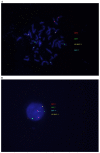Cytogenetics and Cytogenomics Evaluation in Cancer
- PMID: 31547595
- PMCID: PMC6801775
- DOI: 10.3390/ijms20194711
Cytogenetics and Cytogenomics Evaluation in Cancer
Abstract
The availability of cytogenetics and cytogenomics technologies improved the detection and identification of tumor molecular signatures as well as the understanding of cancer initiation and progression. The use of large-scale and high-throughput cytogenomics technologies has led to a fast identification of several cancer candidate biomarkers associated with diagnosis, prognosis, and therapeutics. The advent of array comparative genomic hybridization and next-generation sequencing technologies has significantly improved the knowledge about cancer biology, underlining driver genes to guide targeted therapy development, drug-resistance prediction, and pharmacogenetics. However, few of these candidate biomarkers have made the transition to the clinic with a clear benefit for the patients. Technological progress helped to demonstrate that cellular heterogeneity plays a significant role in tumor progression and resistance/sensitivity to cancer therapies, representing the major challenge of precision cancer therapy. A paradigm shift has been introduced in cancer genomics with the recent advent of single-cell sequencing, since it presents a lot of applications with a clear benefit to oncological patients, namely, detection of intra-tumoral heterogeneity, mapping clonal evolution, monitoring the development of therapy resistance, and detection of rare tumor cell populations. It seems now evident that no single biomarker could provide the whole information necessary to early detect and predict the behavior and prognosis of tumors. The promise of precision medicine is based on the molecular profiling of tumors being vital the continuous progress of high-throughput technologies and the multidisciplinary efforts to catalogue chromosomal rearrangements and genomic alterations of human cancers and to do a good interpretation of the relation genotype-phenotype.
Keywords: biomarkers; driver mutations; genomic alterations; high-throughput technologies.
Conflict of interest statement
The authors declare no conflict of interest.
Figures



References
Publication types
MeSH terms
Substances
Grants and funding
LinkOut - more resources
Full Text Sources

